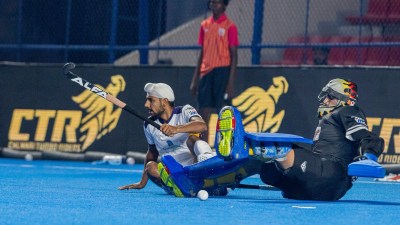Post Chikungunya,do the aches linger?
An Indian Council of Medical Research study finds that very few patients who suffered from the virus had clinical symptoms after a year of persistent aches
The attack rate of the Chikungunya virus CHIK V during the 2006 epidemic in India varied from four to 45 per cent and swept across thousands of villages. Worldwide,it was felt that 10 per cent of people who had suffered from the acute virus would continue to have arthritic aches and pains. So Pune-based Dr Arvind Chopra,chairman of the task force on rheumatic musculo-skeletal disorders in India,took on an Indian Council of Medical Research ICMR project to study the different forms of arthritis people with Chik virus suffered from.
In a systematic study done at two villages in Solapur in Maharashtra,he found that very few patients who suffered from the Chik virus had clinical symptoms after a year of persistent aches and pains. However,the virus persisted in some form or the other. Chopra says that there is now a need to carry out advanced studies to understand the pathological propensity of the virus to cause acute and chronic infection. Their studies at Bavi and Modnimb villages in Solapur have helped set up a large clinical data base on Chik V along with a sera and DNA bank. The Indian Journal of Rheumatology in March this year published Chopras paper that provided data on long term rheumatism as a result of Chik V in Solapur. The Chikungunya virus is a mosquito-borne alphavirus that has caused periodic outbreaks of rheumatic disease in Africa and Asia. The disease involves weeks to months of arthralgia/arthritis and can involve myalgia,fever,and/or a rash. During 2004 to 2007,the largest documented outbreak of Chik V occurred in the Indian Ocean islands and Indiawith 1.39 million cases.
No licensed vaccine or effective drug is available for human use for any alphavirus,although analgesics and nonsteroidal anti-inflammatory drugs can provide relief from rheumatic symptoms. The ICMR project based on tests,performed on 1,500 people has shown that those who had suffered from the virus in 2006almost 95 per cent of them recovered within a month and less than 5 per cent had persistent pains. The epidemic unleashed an unrecognised spectrum of rheumatic musculoskeletal pain RMSK,but the persistence of pain is not supported by data. A total of 347 RMSK cases were registered. Based on medical records,150 cases were classified as RMSK associated with Chik V. Amongst the latter,128 cases were classified as post-Chik V RMSK. Although viruses are responsible for only a small proportion of all cases of acute or chronic arthritis,rheumatologists should be aware of the key clinical manifestations and the tests needed for diagnosis. The identification of a virus as a responsible agent for arthritis can limit unnecessary diagnostic work-up and prevent the initiation of a potentially harmful chronic immunosuppressive therapy,Chopra says.
- 01
- 02
- 03
- 04
- 05































